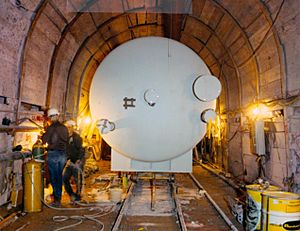Operation Anvil (nuclear test) facts for kids
Quick facts for kids Operation Anvil |
|
|---|---|
| Information | |
| Country | United States |
| Period | 1975–1976 |
| Number of tests | 21 |
| Test type | underground shaft, tunnel |
| Max. yield | 1 megatonne of TNT (4.2 PJ) |
Operation Anvil was a set of 21 nuclear tests carried out by the United States. These tests happened from 1975 to 1976. They took place at the Nevada Test Site, a special area in the desert. These tests were done after a series called Operation Bedrock and before Operation Fulcrum.
Contents
Operation Anvil: Exploring Nuclear Tests
What Was Operation Anvil?
Operation Anvil was a program where the United States government tested nuclear devices. These tests were all done underground. This means the explosions happened deep below the Earth's surface. The main goal was to develop and understand nuclear weapons better.
Where Did These Tests Happen?
All the tests in Operation Anvil took place at the Nevada Test Site (NTS). This site is located in Nevada, a state in the western United States. The NTS is a large area specifically used for testing nuclear devices. Scientists and engineers worked there to conduct these important experiments safely underground.
Why Were These Tests Done?
The tests in Operation Anvil had two main purposes. First, they helped in the development of new weapons. Scientists wanted to make nuclear weapons safer and more effective. Second, some tests studied the effects of weapons. This meant understanding how nuclear explosions behaved underground. They also learned how the ground and nearby structures reacted to these powerful blasts.
Key Facts About the Tests
Operation Anvil included a total of 21 underground nuclear tests. These tests happened over about two years. Most of them involved lowering a nuclear device down a deep hole, called a shaft. Then, it was detonated far below the surface. Some tests were also done in tunnels.
The Biggest Test: Kasseri
The most powerful test in Operation Anvil was named Kasseri. It happened on October 28, 1975. The explosion had a yield of 1 megaton (Mt). A megaton is equal to one million tons of TNT. This was a very large explosion, even though it was contained underground. The Kasseri test used a B77 nuclear bomb.
An Aborted Test: Peninsula
One interesting event was the Peninsula test. It was planned for October 23, 1975. However, the device got stuck while being lowered into the shaft. Because of this, the test was stopped. The device was later destroyed in a different operation. This shows that even with careful planning, unexpected things can happen during complex operations.
Testing Underground Movement
One test, named Cheshire, had a special purpose. It happened on February 14, 1976. This test was designed to study how radioactive materials move underground. Scientists wanted to see how these materials traveled through volcanic rock and soil. This research helped them understand how to keep the environment safe after underground tests.
 | Toni Morrison |
 | Barack Obama |
 | Martin Luther King Jr. |
 | Ralph Bunche |


